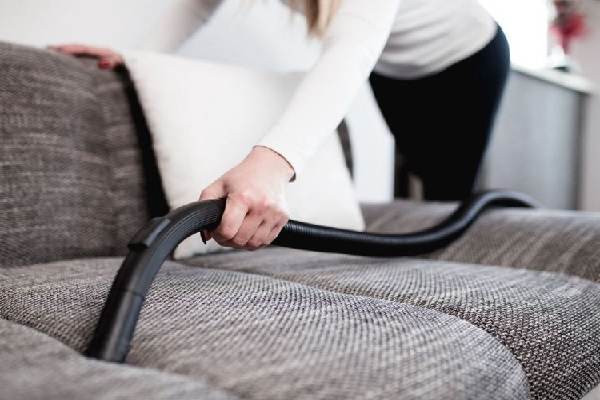Polyester is a popular material for making sofas and couches due to its durability, stain-resistant properties, and low maintenance needs. But over time, dirt, dust, and grime can accumulate on the surface of the polyester, making it look dull and dingy.
If you want to keep your polyester couch looking its best, it is important to clean it regularly and effectively. Here is a step-by-step guide on how to clean polyester couch effectively.

Materials Needed
Before you start cleaning your polyester couch, it is important to gather all the necessary materials. You will need the following items:
- Vacuum cleaner with a brush attachment
- Soft cloths
- Water
- Mild detergent
- White vinegar
- Baking soda
- Hydrogen peroxide
Step 1: Vacuum Your Polyester Couch
The first step in cleaning your polyester couch is to remove any loose dirt and debris from the surface of the fabric. Use a vacuum cleaner with a brush attachment to remove all the dirt, dust, and pet hair from the couch.
Vacuum the entire couch, including the arms, seat, back, and cushion. This step is important as it helps to prevent any dirt or debris from spreading or rubbing into the fabric while you are cleaning it.
Step 2: Clean Stains with a Mild Detergent
Polyester is known for being stain-resistant, but that doesn’t mean that it is immune to all types of stains. If there are any spills or stains on your polyester couch, use a mild detergent mixed with water to clean them. Here is what you need to do:
- Mix a small amount of mild detergent with water in a spray bottle.
- Spray the solution onto the stained area.
- Use a soft cloth to gently scrub the stain.
- Rinse the area with clean water and blot it dry with a soft cloth.
Step 3: Use White Vinegar for Deeper Cleaning
White vinegar is a natural cleaning agent that can help to remove dirt, grime, and stubborn stains from your polyester couch. Here is how you can use white vinegar to clean your couch:
- Mix equal parts of water and white vinegar in a spray bottle.
- Spray the solution onto the surface of your polyester couch.
- Use a soft cloth to gently scrub the fabric.
- Rinse the area with clean water and blot it dry with a soft cloth.
Step 4: Use Baking Soda for Odor Removal
If your polyester couch has developed an unpleasant odor, baking soda can help to remove it. Here is what you need to do:
- Sprinkle baking soda over the entire surface of your polyester couch.
- Let the baking soda sit for at least an hour.
- Vacuum the baking soda from the couch.
Step 5: Use Hydrogen Peroxide for Stains and Odors
Hydrogen peroxide is a powerful cleaning agent that can help to remove tough stains and odors from your polyester couch. Here is how you can use hydrogen peroxide to clean your couch:
- Mix equal parts of hydrogen peroxide and water in a spray bottle.
- Spray the solution onto the stained area.
- Let the solution sit for 5-10 minutes.
- Use a soft cloth to gently scrub the stain.
- Rinse the area with clean water and blot it dry with a soft cloth.
Tips for Maintaining Your Polyester Couch
To keep your polyester couch looking its best, it is important to follow these tips:
- Vacuum your couch regularly to remove dirt, dust, and pet hair.
- Blot spills immediately with a clean cloth.
- Avoid using harsh chemicals or abrasive scrubbers on your couch.
- Protect your couch from direct sunlight and heat sources.
- Rotate and flip the cushions regularly to prevent uneven wear.
Conclusion
Cleaning your polyester couch regularly is an important step in maintaining its appearance and prolonging its lifespan. By following the steps outlined in this guide, you can effectively remove dirt, stains, and odors from your polyester couch and keep it looking its best.
Remember to always use gentle and safe cleaning methods, and if in doubt, always check the care instructions provided by the manufacturer.









